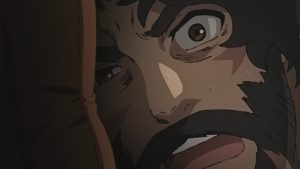 And then there’s Nomad: Megalo Box 2, which is kind of laughing at everything else and contentedly doing its own thing. Forget the Super League, Nomad doesn’t need the help of a bunch of greedy billionaires and a fixed system – it just does it better than anyone else. It’s no disrespect to anime to say this series isn’t really like an anime, because there aren’t many like it in any medium you could choose. I could ask nothing more from the first three episodes of a series, which is all the more remarkable given that I was skeptical about this one’s need to exist in the first place.
And then there’s Nomad: Megalo Box 2, which is kind of laughing at everything else and contentedly doing its own thing. Forget the Super League, Nomad doesn’t need the help of a bunch of greedy billionaires and a fixed system – it just does it better than anyone else. It’s no disrespect to anime to say this series isn’t really like an anime, because there aren’t many like it in any medium you could choose. I could ask nothing more from the first three episodes of a series, which is all the more remarkable given that I was skeptical about this one’s need to exist in the first place.
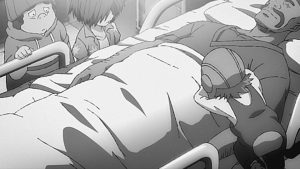 What’s most important about this series is without question that it’s beautifully written and (albeit not lavishly) produced. But I don’t think it can be overlooked that it’s mercilessly condemning the treatment of immigrants in Japan. That’s a subject that’s normally taboo (they have a lot of those here), and unsurprisingly, given how much the country has to be ashamed of in this respect. Maybe it’s the fact that it’s dressed up as a story about the immigrant experience in America (which is fair game too, no question) that’s allowed this premise to survive to production. I wouldn’t be shocked if the people who’d be most offended by what this show is about are incapable of realizing that they’re being played.
What’s most important about this series is without question that it’s beautifully written and (albeit not lavishly) produced. But I don’t think it can be overlooked that it’s mercilessly condemning the treatment of immigrants in Japan. That’s a subject that’s normally taboo (they have a lot of those here), and unsurprisingly, given how much the country has to be ashamed of in this respect. Maybe it’s the fact that it’s dressed up as a story about the immigrant experience in America (which is fair game too, no question) that’s allowed this premise to survive to production. I wouldn’t be shocked if the people who’d be most offended by what this show is about are incapable of realizing that they’re being played.
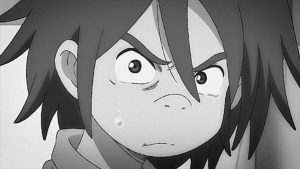 What’s hard to dispute for me is that Nomad has thematically raised the bar from Megalo Box in every sense. This is a subtler, more reflective, more somber story – a much more “grown-up” version of what was already a very mature and nuanced premise. That it so little resembles any conventional anime is unsurprising given that the writers are not anime writers – they work in films and TV drama. That includes Shinya Shokudou, which is a series (albeit based on a manga) which is similarly focused on the forgotten and disdained in society.
What’s hard to dispute for me is that Nomad has thematically raised the bar from Megalo Box in every sense. This is a subtler, more reflective, more somber story – a much more “grown-up” version of what was already a very mature and nuanced premise. That it so little resembles any conventional anime is unsurprising given that the writers are not anime writers – they work in films and TV drama. That includes Shinya Shokudou, which is a series (albeit based on a manga) which is similarly focused on the forgotten and disdained in society.
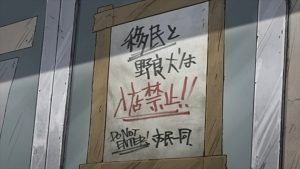 I had only one real criticism of the first two eps, in fact. That was Joe seemingly kicking the opiates far too easily – and I fully retract it, because Nomad had that covered. Joe’s withdrawal is ongoing and crippling, and it’s a process that Chief has gone through himself after the death of his son. We still don’t know what happened with Joe’s downfall, but Nanbu’s appearances are obviously Joe’s guilt manifesting itself with the aid of his withdrawal. Nanbu was clearly sick, and it seems as if Joe asked him to train him anyway – perhaps “one more big shot”. Did the overwork cause Nanbu to die sooner than he would have – and this is why Sachio blames Joe? Or is there more to this than that?
I had only one real criticism of the first two eps, in fact. That was Joe seemingly kicking the opiates far too easily – and I fully retract it, because Nomad had that covered. Joe’s withdrawal is ongoing and crippling, and it’s a process that Chief has gone through himself after the death of his son. We still don’t know what happened with Joe’s downfall, but Nanbu’s appearances are obviously Joe’s guilt manifesting itself with the aid of his withdrawal. Nanbu was clearly sick, and it seems as if Joe asked him to train him anyway – perhaps “one more big shot”. Did the overwork cause Nanbu to die sooner than he would have – and this is why Sachio blames Joe? Or is there more to this than that?
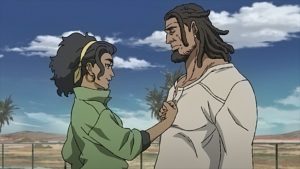 Clearly we haven’t see the last of Sachio, because in order for Joe to move on he needs to make peace not with a ghost but with a living piece of his past, and that’s Sachio. Chief is making his peace by trying to single-handedly save his village, so he can use all the help he can get. His reveal to Joe about the theme of his saloon ballad – a call to the restless souls of the dead to return home – only solidifies the impression that was left when Joe had his wolf encounter in the desert. The implication is almost as if Joe is already a ghost himself, which certainly doesn’t bode well for his prospects with the ending (which haven’t looked too good all along, to be honest).
Clearly we haven’t see the last of Sachio, because in order for Joe to move on he needs to make peace not with a ghost but with a living piece of his past, and that’s Sachio. Chief is making his peace by trying to single-handedly save his village, so he can use all the help he can get. His reveal to Joe about the theme of his saloon ballad – a call to the restless souls of the dead to return home – only solidifies the impression that was left when Joe had his wolf encounter in the desert. The implication is almost as if Joe is already a ghost himself, which certainly doesn’t bode well for his prospects with the ending (which haven’t looked too good all along, to be honest).
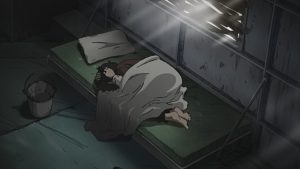 As a trainer, Joe is exactly what Chief needs. He knows the ins and outs of these tournaments, and basically counsels Chief to play rope-a-dope for as long as he can and try to save himself for the final match. But Hikawa’s unnerving calm as Chief rolls through his first match shows that he’s not about to leave this up to chance and Chief’s skill. It starts with nasty graffiti, moves on to sabotaging water pumps – and in the end, as it always does in these situations, escalates into violence. I can’t imagine Chief is going to come out of that burning trailer unscathed, but whatever the case what’s happening now is effectively a war.
As a trainer, Joe is exactly what Chief needs. He knows the ins and outs of these tournaments, and basically counsels Chief to play rope-a-dope for as long as he can and try to save himself for the final match. But Hikawa’s unnerving calm as Chief rolls through his first match shows that he’s not about to leave this up to chance and Chief’s skill. It starts with nasty graffiti, moves on to sabotaging water pumps – and in the end, as it always does in these situations, escalates into violence. I can’t imagine Chief is going to come out of that burning trailer unscathed, but whatever the case what’s happening now is effectively a war.
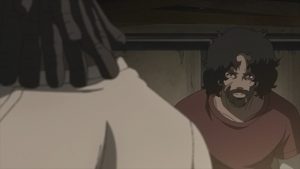 In a country where immigrants are routinely harassed, verbally abused, and exploited, this is a very edgy course for Megalo Box to take. And with the country it’s superficially based on undergoing its own rise in white nationalism and anti-immigrant terror, the timing could hardly be more apt. But in the end, Megalo Box 2 is only as good as the story it’s telling – and even just focusing on the character side that story is already masterpiece material. It makes such a huge difference when a series comes from someone who clearly has something to say – that alone doesn’t elevate it to art, but it’s pretty much impossible to get there without it.
In a country where immigrants are routinely harassed, verbally abused, and exploited, this is a very edgy course for Megalo Box to take. And with the country it’s superficially based on undergoing its own rise in white nationalism and anti-immigrant terror, the timing could hardly be more apt. But in the end, Megalo Box 2 is only as good as the story it’s telling – and even just focusing on the character side that story is already masterpiece material. It makes such a huge difference when a series comes from someone who clearly has something to say – that alone doesn’t elevate it to art, but it’s pretty much impossible to get there without it.


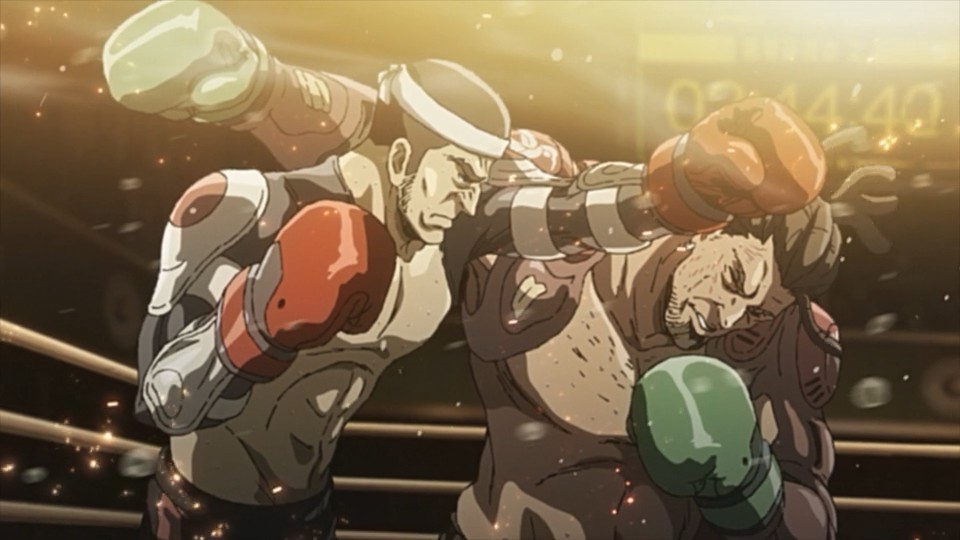
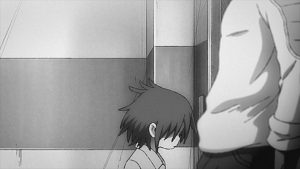
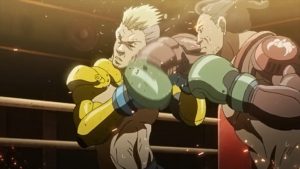
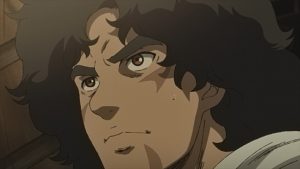
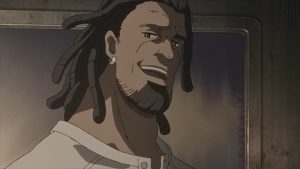
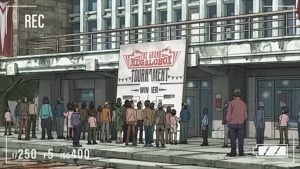
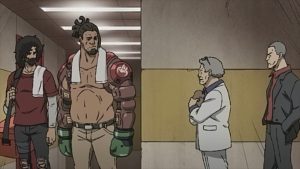
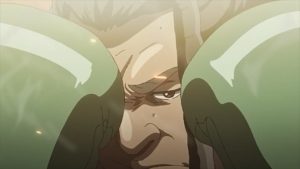
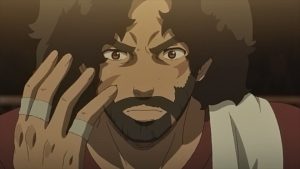
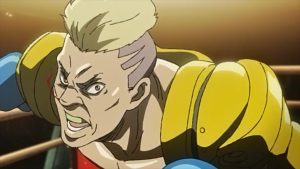
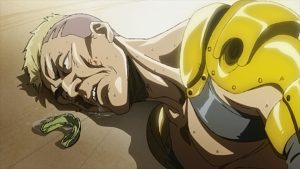
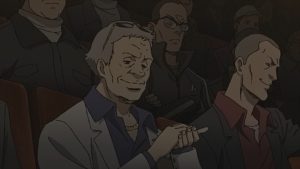
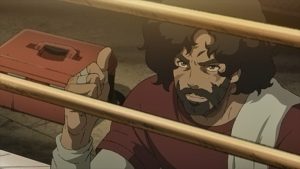
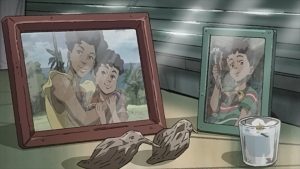
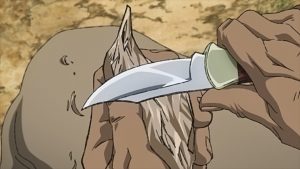
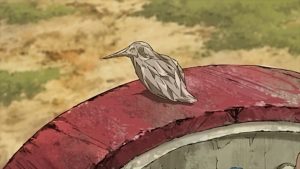
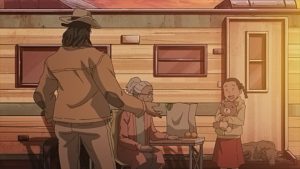
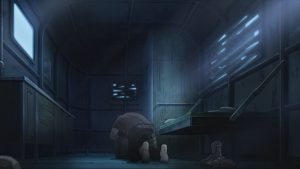
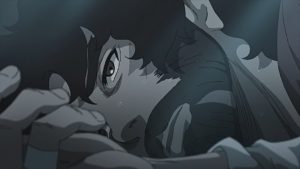
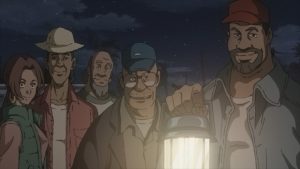
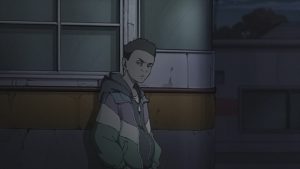
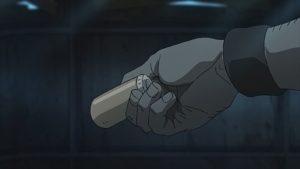
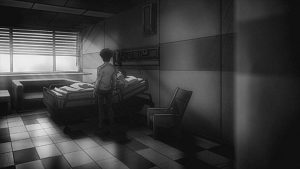
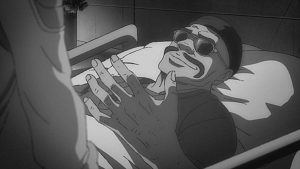
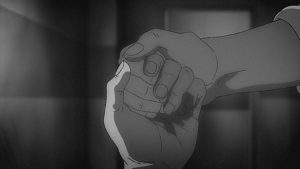
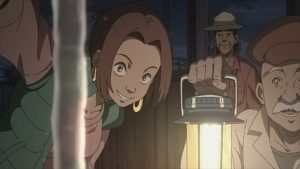
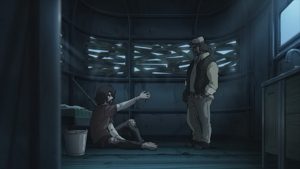
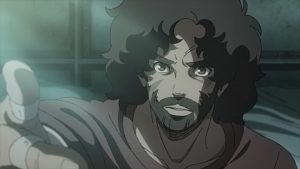

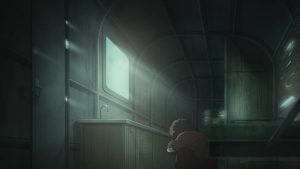
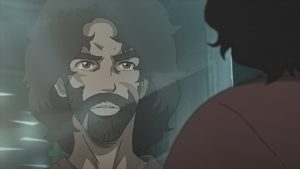
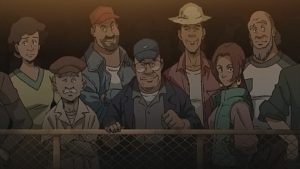
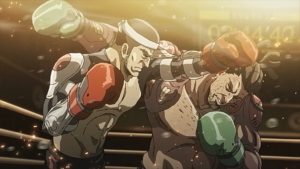
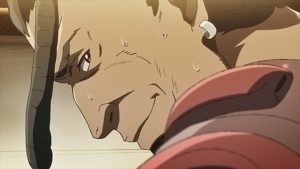
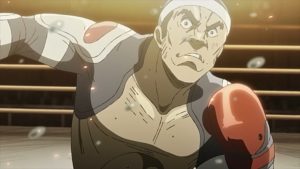
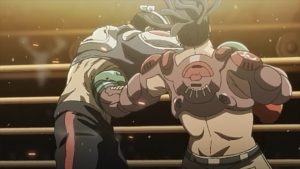
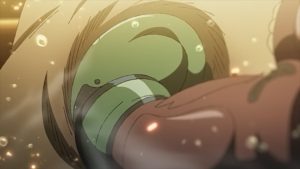
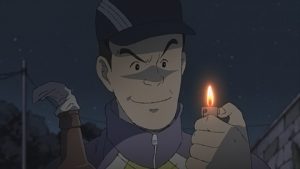
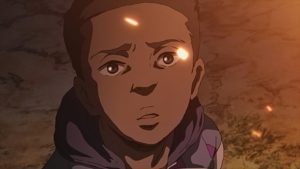
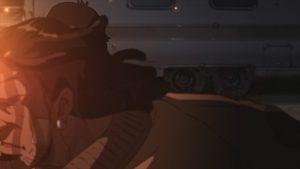
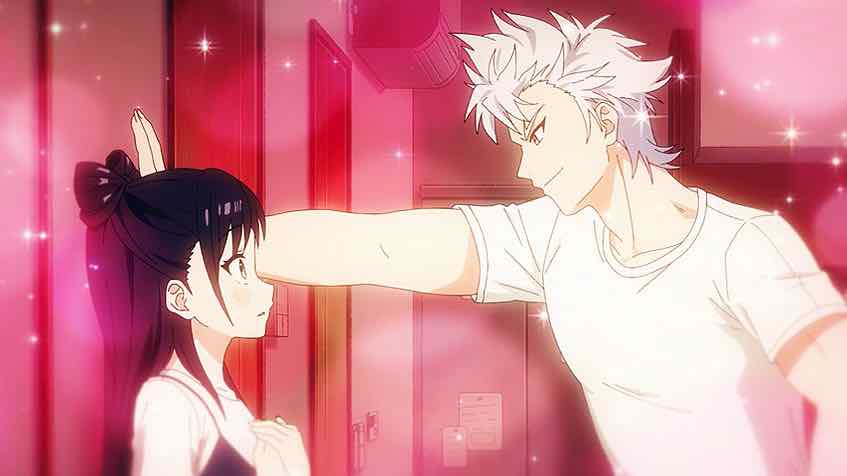
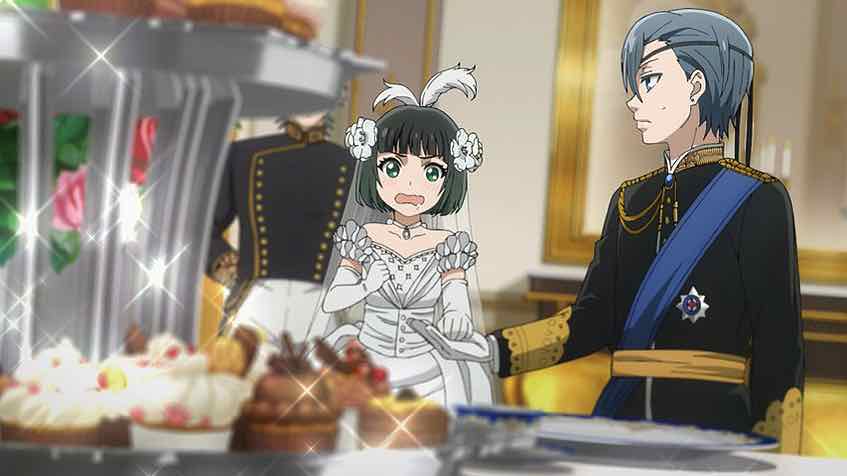
leongsh
April 19, 2021 at 10:31 pm3 episodes in, Megalo Box 2: Nomad is well ahead of the Spring 2021 season pack. For now. It’s because this season, there are a couple of shows that could keep pace with it.
There seems to be some passing similarity with Ashita no Joe in terms of general overall arc. The first part of it ends after the match with Riikishi which Megalo Box ends with the match against Yuri but with a twist that does not end in the death of Yuri. The second part of AnJ starts with Joe running away from the Danpei gym and wandering to get away from his guilt over Riikishi’s death and having to overcome PTSD to return to boxing. In Megalo Box 2, Nameless Joe is wandering aimlessly after the death of Nanbu which he feels heavy guilt over. Will it end the same way as the second part of AnJ… I hope it doesn’t.
Elia Notari
April 19, 2021 at 10:53 pmI didn’t think you were someone that knew about football (or soccer), but I see that the Super League clusterfuck has managed to travel across continents and seas, I imagine how badly was received even by the japanese.
Guardian Enzo
April 19, 2021 at 11:08 pmI’ve actually written about soccer quite a lot over the years here.
Elia Notari
April 20, 2021 at 1:43 amI’ve never read it before, my bad man!
sonicsenryaku
April 19, 2021 at 11:00 pm*I had only one real criticism of the first two eps, in fact. That was Joe seemingly kicking the opiates far too easily – and I fully retract it, because Nomad had that covered*
Yea i was gonna bring this up to you in your write up last week, but ultimately decided to stay silent on it and let the narrative do its thing. I was gonna point out that Joe is going through a phase a bunch of drug addicts go through in it can seem as if they’ve confidently kicked the drug completely, only to end up going through extreme withdrawals and relapsing into their addiction. As such, it wouldn’t surprise me if Joe went through multiple episodes of relapse, and given what transpired in this week’s ep, my read on the situation is beginning to be proven correct
Raikou
April 20, 2021 at 6:48 amYeah, I think there’s more to Sachio hates Joe because of Nanbu’s death. The TV news in episode 1 seems to be hinting something…
I love shinya shokudou. Wish it got more seasons, the writer is really good.
And really, it was only a matter of time before shit hits the fan. Won’t be surprised that after this fire Hikawa’s gonna do some shitty things.
kiwi
April 20, 2021 at 11:45 amThis show is so good; I almost wish I had taken the time to rewatch the first season before this one just for dramatic effect. I also agree this show is taking some bold (and needed!) stances criticizing xenophobia. We saw a little bit of this in the first season (when Joe couldn’t compete in Megalovania bc of his illegal status/ no ID), but the thread was ultimately dropped by the end. In this season, I’d like to see a continued exploration of Joe’s past and connect it to the struggle of Chief & his folks. Maybe we’ll see Joe fess up about his own past to defend the immigrant community. Anyway this is easily the show I’m looking forward to the most every week. 😀